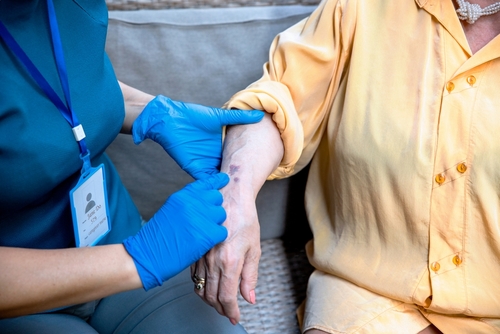
Bruises: we see them on the bodies of people from all different walks of life. When bruises begin appearing on residents of a nursing home, however, it can be a sign that something far more sinister is taking place. While occasional bruising may be normal due to the frailness of elderly skin, there are times when bruises warrant further investigation. If your loved one lives in a nursing home and you begin to notice bruises that appear out of the ordinary, it may be worth considering calling an attorney for guidance on what to do.
What to Look Out for in Nursing Home Bruises
Here is what you should keep an eye out for:
- Frequency and pattern of bruises – One of the first red flags is the frequency and pattern of bruises. An occasional bruise can be common in elderly adults due to thinner skin and increased fragility. However, if you notice bruises appearing frequently or in clusters, this may indicate an underlying issue. Make sure to pay close attention to bruises in strange places like the torso, inner thighs, or arms, as these areas are less prone to accidental injury and might suggest rough handling or abuse.
- Size and color of the bruises – Another aspect to consider is the size and color of the bruises. Large, dark, and deep bruises should raise immediate concerns. Bruises that change color over an extended period, such as turning yellow to green, may indicate an older injury, which could suggest chronic issues. Multiple bruises at different stages of healing could indicate prolonged abuse or ongoing neglect.
- Explanations from nursing home staff – When you notice a bruise on your loved one, it is important to ask the nursing home staff for an explanation. A credible and consistent explanation for the injury may provide peace of mind. However, if nursing home staff seem evasive, provide inconsistent stories, or appear defensive, this could be a sign that something is wrong. Remember that reliable nursing homes will have incident reports and logs to explain accidents or injuries, so lack of documentation should also be a concern.
- Changes in behavior or mood – Sure, most people experience changes in mood from time to time. That being said, if your loved one’s mood changed around the time his or her bruises began appearing, it may be a sign of something else at play. Such signs should not be ignored.
Contact Our Peoria County, IL Nursing Home Abuse Attorney
While it may be true that older people bruise more easily, there are still specific signs that should prompt immediate concern and action. If you suspect your loved one’s bruises were potentially caused by abuse, Peoria, IL nursing home abuse lawyers at Nursing Home Injury Center can help. Call 309-524-6900 to schedule a complimentary consultation.



